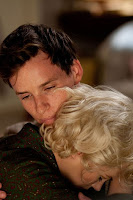 Colin (Eddie Redmayne) had the great fortune of having Sir Laurence Olivier (Kenneth Branagh) be a friend of the family and through that connection--and a determined persistence--managed to obtained a job on the actor's next project, yes, The Sleeping Prince. Olivier was also directing the picture and from the moment of Monroe's arrival was a thorn in his side. "I think directing a movie is the best job ever created, but Marilyn has cured me of ever wanting to do it again," he laments to Colin. The notoriously fragile Monroe had an array of handlers--coddlers, really--that allowed her to slow and sometimes simply halt the day's production of the movie. But Monroe, feeling alienated by Olivier and much of the rest of the cast and crew and also abandoned by her new husband after returning to the States, finds a new confidante in Colin.
Colin (Eddie Redmayne) had the great fortune of having Sir Laurence Olivier (Kenneth Branagh) be a friend of the family and through that connection--and a determined persistence--managed to obtained a job on the actor's next project, yes, The Sleeping Prince. Olivier was also directing the picture and from the moment of Monroe's arrival was a thorn in his side. "I think directing a movie is the best job ever created, but Marilyn has cured me of ever wanting to do it again," he laments to Colin. The notoriously fragile Monroe had an array of handlers--coddlers, really--that allowed her to slow and sometimes simply halt the day's production of the movie. But Monroe, feeling alienated by Olivier and much of the rest of the cast and crew and also abandoned by her new husband after returning to the States, finds a new confidante in Colin.Much of the film consists of Colin merely observing, sitting back almost unnoticed watching the drama between Monroe and everyone else unfold. For all of his assertiveness early on, much of the action in the narrative is thrust upon him. Monroe doesn't merely lure her into their friendship, she basically instigates it. He's merely clever enough to hang on for the ride.
 And that's only part of the oddity of this film. For while his week with Monroe is Colin Clark's story, the movie is really Marilyn's. That is to say, the film belongs to Michelle Williams, who--and here's a serious case of burying the lede--plays the legend and does so in a way that nearly elevates what is a fairly pedestrian film. Monroe was an icon among icons and her presence not only in those great movies but also in the popular consciousness transcended even that of her fellow celebrities. Given she also died so young, the potency of her stardom proved that much stronger. It's as if she was dropped out of the sky; she existed in the periphery of what we could comprehend. The performance by Williams--who, it should be mentioned, is emerging as the best actress of her generation--exists in the same way. Her performance as Monroe almost belongs in another film--a better film. The movie is a period piece to be sure, but its world and a good number of its performances feel like they belong in a museum. Williams's performance is the only one that feels urgent, her Monroe is the only one on the screen who feels present. Everything else around her feels cold and distant. Olivier may have felt like he wanted to shake Marilyn into waking up for the shoot but I felt that way about the movie itself.
And that's only part of the oddity of this film. For while his week with Monroe is Colin Clark's story, the movie is really Marilyn's. That is to say, the film belongs to Michelle Williams, who--and here's a serious case of burying the lede--plays the legend and does so in a way that nearly elevates what is a fairly pedestrian film. Monroe was an icon among icons and her presence not only in those great movies but also in the popular consciousness transcended even that of her fellow celebrities. Given she also died so young, the potency of her stardom proved that much stronger. It's as if she was dropped out of the sky; she existed in the periphery of what we could comprehend. The performance by Williams--who, it should be mentioned, is emerging as the best actress of her generation--exists in the same way. Her performance as Monroe almost belongs in another film--a better film. The movie is a period piece to be sure, but its world and a good number of its performances feel like they belong in a museum. Williams's performance is the only one that feels urgent, her Monroe is the only one on the screen who feels present. Everything else around her feels cold and distant. Olivier may have felt like he wanted to shake Marilyn into waking up for the shoot but I felt that way about the movie itself.It makes for a particularly muddy film. If we are to see everything through Colin's eyes instead of Monroe's, then the stakes feel substantially low. The deep, scar-ridden psychology of Monroe gets subsumed by the thin nostalgia of Colin's celebrity tryst. By the end, it feels like nothing more than Colin's summer vacation. And, sadly, that does a disservice to both Ms. Monroe and Ms. Williams.

No comments:
Post a Comment